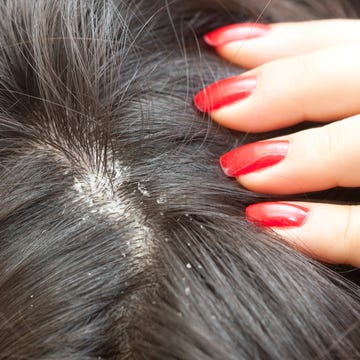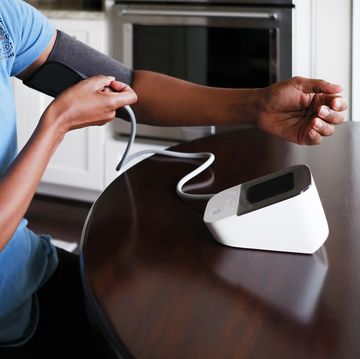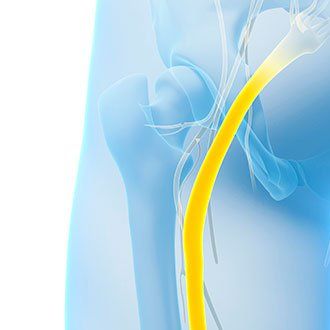Whether you're in the camp to legalize marijuana or would rather keep it restricted (no judging, here!), it's high time to size up its medical claims. Pot pre-dates the Egyptian pyramids—but it took till now for 23 states to give their A-Okay for its medicinal use. Prevention asked top docs whether cannabis, med-speak for marijuana, is actually helpful (or at least promising) for nearly two dozen health woes ranging from multiple sclerosis to migraines, cancer pain to epilepsy.
Two things to keep in mind as you're reading: Most of the research involves marijuana or its individual psychoactive compounds administered in carefully measured doses—a far cry from the variability in strains being sold on the street or even in dispensaries. "That's the equivalent of buying penicillin at a flea market," contends Ivor Grant, MD, chair of the department of psychiatry at the University of California San Diego School of Medicine. And there's just not a lot of research yet, period. The FDA hasn't removed marijuana from its "schedule-one" drug designation, which it reserves for substances that have no acceptable medical use. "Few doctors have the special permission required to work with schedule-one drugs," notes Otis Brawley, MD, chief medical and scientific officer of the American Cancer Society. "Cocaine is less restricted than marijuana."
Even so, experts have been able to cobble together enough info to tell you what has merit and what's just bogus. Pot, here's your first report card.
FOR TREATMENT NOW
The first part of this report card analyzes marijuana's effectiveness at treating conditions that have at least a decent amount of research.
For: Nausea Relief
Objective: Help ease the nausea and vomiting that chemo-bound cancer or AIDS patients experience
Effectiveness Grade: A
Test Results: Marijuana aced this category because in the late '80s, the FDA approved synthetic versions of its main psychoactive compound, Tetrahydrocannabinol (THC). Doctors can write prescriptions for dronabinol (brand name: Marinol) and nabilone (sold as Cesamet). In one study at St. John's Hospital in Tulsa, Oklahoma, researchers found that 38% of AIDS patients taking 5 milligrams of Marinol for six weeks had better appetite and less nausea compared to 8% of patients on the placebo. On the cancer front, a large Swiss review concluded that both marijuana meds were more effective than common anti-nausea drugs for patients receiving most types of chemotherapy. In fact, the National Comprehensive Cancer Network, an alliance of 26 leading cancer centers, recommends the medications in its guidelines for treating nausea and vomiting.
Room for Improvement: Inhaled marijuana, which is better absorbed in the bloodstream, hasn't been widely studied to quell nausea, likely because a commercial product isn't available in the U.S. Another caveat: "Many of the studies looked at symptom relief in the short-term," says Grant. "We need research that tracks patients for a couple of years at least."
For: Nerve Pain Relief
Objective: Help quell the burning pain in the feet and hands caused by diabetes, AIDS, spinal cord injuries, and other conditions
Effectiveness Grade: B+
Test Results: Promising—in a series of head-to-head trials between marijuana cigarettes of varying strengths containing TCH with other compounds against traditional pain medication, Grant found that the cigarettes were comparable and sometimes even superior to classic drugs. And a review of 13 studies by the University of California San Francisco noted that the cigarettes overall may provide pain relief for patients with chronic neuropathic pain that can't be controlled with other treatments. "It's not a magic bullet," says Grant. "But it could be one more resource in the pain-control arsenal for patients with this type of pain."
Room for Improvement: Doctors hope one day to have an FDA-approved product, like the marijuana-based medicines to treat nausea. Until then, it puts them in a tough spot to recommend medical marijuana because they can't be sure what their patients are getting—or what the long-term side effects might be. "With patients being able to get marijuana for themselves, "there's an uncontrolled experiment going on, and someone is bound to be harmed," warns Brawley.
MORE: Ask Dr. Gupta: Is Medical Marijuana A Good Thing?
For: Multiple Sclerosis
Objective: Control the debilitating muscle spasms and stiffness, which often interfere with sleep and even walking
Effectiveness Grade: B
Test Results: Patients in more than two dozen countries have access to Sativex, an oral spray that contains a derivative of several marijuana compounds, including THC and the main non-psychoactive compound cannabidiol (CBD). In one British study of 66 MS patients, 42% experienced relief compared to 16% in the placebo group. The medication is now in the final phase of clinical trials in the US, with results expected in the next year or two. "It's a pretty popular therapy in Europe," says Bruce BeBo, PhD, executive vice president of research for the National Multiple Sclerosis Society. "It would be just terrific to have another treatment that helps patients."
Room for Improvement: There's no solid proof that smoked marijuana improves MS symptoms. "And just like wine, the potentially beneficial compounds vary based on growing conditions," cautions BeBo.
For: General Chronic Pain Relief
Objective: Ease the pain from cancer and other conditions like severe headaches, arthritis, and some kinds of back injuries that aren't nerve-related
Effectiveness Grade: C-
Test Results: Sorry, marijuana doesn't seem to be that effective in this area—if at all. One study from Oxford University noted that TCH in pill form made the experience of pain more tolerable, but didn't reduce its intensity. And a study earlier this year of Sativex found that it wasn't better than a placebo at controlling cancer pain. "This area is where medicinal marijuana is abused," says Ken Gershman, MD, manager of the Medical Marijuana Research Grant Program at the Colorado Department of Health & Environment. "More than 90% of medical marijuana users request it for pain control, but many don't have the neuropathic pain that it actually works for."
Room for Improvement: GW Pharmaceuticals, the British makers of Sativex, is continuing its pain research with two other studies in the works. If they show positive results, the company could still petition the FDA for approval of Sativex for cancer pain.
MORE: The 10 Most Painful Conditions
FOR FUTURE TREATMENT
This part of the report card scores marijuana's potential to one day be worked into an effective treatment.
For: Epilepsy
Objective: Reduce the number of seizures in children and adults with Dravet Syndrome and Lennox-Gastaut Syndrome, types of epilepsy that are difficult to control with current medications
Effectiveness Grade: A
Test Results: Hopeful findings from animal studies have led to the development and testing of Epidiolex, a strawberry-flavored oil containing CBD. More than 150 patients in six centers around the country are taking part in the study, with results expected by the end of the year. "There was mind-boggling interest in this trial," says Orrin Devinsky, MD, director of the comprehensive epilepsy center at NYU Langone Medical Center in New York City. "In almost every state, there are patients with epilepsy that are taking medicinal marijuana in hopes of relief."
For: Crohn's Disease
Objective: Ease the need for medication and surgery for patients with this type of inflammatory bowel disease, which often irritates the small intestine.
Effectiveness Grade: B+
Test Results: So far, so good. In one study at Tel Aviv University of 21 people who didn't respond well to traditional treatments, 45% of the group who received marijuana cigarettes high in THC went into remission compared to 10% of the group who got the placebo. But most of the patients relapsed after going off marijuana—and long-term smoking could damage the lungs. Plus, the study was super small and needs to be repeated with a larger group.
For: Cancer Treatment
Objective: Slow or halt the growth of cancer cells
Effectiveness Grade: B
Test Results: In lab studies, TCH and CBD has been shown to slow or halt the growth of tumor cells, according to the American Cancer Society. And in animal studies, early research suggests that it may prevent the spread of some types of cancer. For instance, one study from the University of London found this one-two punch helps shrink gliomas, an aggressive type of brain tumor. Some human trials are in the works, so while there's a lot of potential, there's just not evidence in patients at this point.
For: Parkinson's Disease
Objective: Reduce the tremors in this nervous system disorder as well as the stiffness in the arms and legs
Effectiveness Grade: B-
Test Results: "Our hopes were dashed—the studies that looked at whether medicinal marijuana could improve motor symptoms didn't pan out," says James Beck, PhD, director of research programs for the Parkinson's Disease Foundation. But there's ongoing research to see whether it might help with painful tightening of muscles that patients experience.
For: Alzheimer's Disease
Objective: Help slow down the progression of this condition—or prevent it
Effectiveness Grade: C
Test Results: Just last year, researchers from the University of South Florida found that THC may slow or halt the progression of the condition—but their research used a cellular model, a far cry from patient studies. "And there has been other research that shows it doesn't have an impact on the condition or may have a negative effect," says Heather Synder, PhD, director of medical and scientific relations for the Alzheimer's Association. Bottom line: Inconclusive.
MORE: This Is The Most Promising Lead Yet For An Alzheimer's Cure
For: Anxiety Disorders
Objective: Reduce stress in social situations
Effectiveness Grade: C
Test Results: Mixed. A new study might explain why: Researchers at Vanderbilt University have found marijuana receptors in the part of the brain that regulates anxiety and controls stress responses. Occasional use may reduce symptoms, but chronic smoking may actually have the opposite effect. Experts say more studies are needed to sort out the complicated relationship.
For: Post-Traumatic Stress Disorders
Objective: Ease the nightmares and other symptoms of PTSD
Effectiveness Grade: C
Test Results: Mixed. A couple of studies in Canada showed that Cesamet (a pill version used for nausea relief) helps prevent nightmares of returning soldiers. But another study at Yale University found that marijuana actually worsened symptoms and users were more likely to have violent behavior.
For: Weight Loss
Objective: Drop a few pounds by kicking up metabolism
Effectiveness Grade: C
Test Results: At this point, there's just one connection: In a study of more than 4,600 people, current marijuana users had, on average, a smaller waist and lower levels of insulin resistance. While the researchers speculated that marijuana may have a beneficial effect on the way your body metabolizes food, there's no proof so far. So while it hasn't been ruled out, it's certainly not a reason to smoke. (In the meantime, give these 8 proven weight loss strategies a try.)
For: Lupus
Objective: Help reduce pain—especially joint aches—in patients with this autoimmune disorder and prevent the disease from progressing
Effectiveness Grade: D
Test Results: While there's not a lot of research yet, it doesn't look promising. One recent study from the University of New Mexico tracked pain levels and disease activity for five years in patients who smoked medicinal marijuana and those who didn't. They found no differences between the groups for those benchmarks, and noticed that the pot users were 85% more likely to have end-stage kidney disease.
MORE: 100 Tricks To Fight Pain Naturally
For: Glaucoma
Objective: Lower pressure within the eye, reducing the progression of the disease
Effectiveness Grade: D
Test Results: While some studies have shown that glaucoma reduces eye pressure, its effect lasts only three to four hours. The Glaucoma Research Foundation notes that you'd practically have to smoke pot around the clock to effectively treat the condition, and that the medications on the market are more effective for treating glaucoma.
The former senior editor at Parents who started the brand’s awards programs, Karen Cicero is a seasoned journalist who specializes in travel, book, lifestyle and food coverage.Cicero has visited almost every state with her family (look out Wyoming, she’s coming for you next!) She recently presented at several travel industry conferences, including PRSA and the Mid-Atlantic Tourism Alliance. A mom who goes overboard for all the holidays, Cicero lives in the Christmas city itself: Bethlehem, Pennsylvania.














